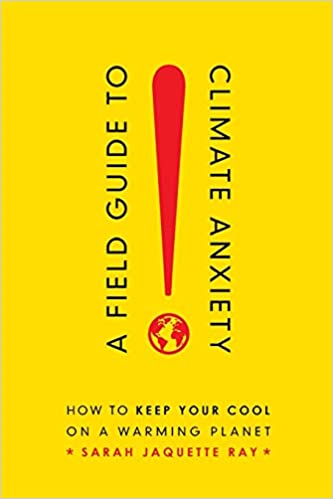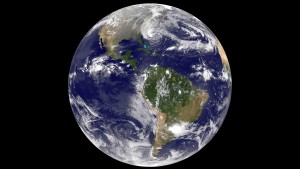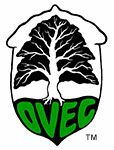- Like
- Digg
- Del
- Tumblr
- VKontakte
- Buffer
- Love This
- Odnoklassniki
- Meneame
- Blogger
- Amazon
- Yahoo Mail
- Gmail
- AOL
- Newsvine
- HackerNews
- Evernote
- MySpace
- Mail.ru
- Viadeo
- Line
- Comments
- Yummly
- SMS
- Viber
- Telegram
- Subscribe
- Skype
- Facebook Messenger
- Kakao
- LiveJournal
- Yammer
- Edgar
- Fintel
- Mix
- Instapaper
- Copy Link
 Sarah Jacquette Ray’s book, A Field Guide to Climate Anxiety, was published before two major crises occurred: the novel coronavirus, and the economic implosion. These crises affect everyone on the planet, for COVID-19 and the subsequent effects on world economies are touching upon every human life. These crises cause the very things that are detrimental to our living successfully and happily on the planet as the earth’s climate continues to warm. Thus, this book is most timely, and may be viewed as addressing them, as well as the crisis our changing climate presents.
Sarah Jacquette Ray’s book, A Field Guide to Climate Anxiety, was published before two major crises occurred: the novel coronavirus, and the economic implosion. These crises affect everyone on the planet, for COVID-19 and the subsequent effects on world economies are touching upon every human life. These crises cause the very things that are detrimental to our living successfully and happily on the planet as the earth’s climate continues to warm. Thus, this book is most timely, and may be viewed as addressing them, as well as the crisis our changing climate presents.
Ray writes for her students, Gen Z college juniors born at the end of the 1990s and early 2000s, who may be anxious and depressed about the climate emergency wrought by living in the Anthropocene age, where ecosystems are being compromised by human intervention, but who refuse to be the last letter of the generational alphabet. Ray calls this the “climate generation” because this cohort will have the energy and power to help right the wrongs of the Anthropocene…mainly by reducing/eliminating the influence of extractive industries.
The subtitle of her book, How to Keep Your Cool On a Warming Planet, suggests the guide that comprises the book. Ray stresses (!) that stress is not helpful in sustaining the effort to create a planet friendly to all living things, that guilt over not ever being able to do enough to “save” the planet is actually detrimental to making sustained change.
Ray’s book is replete with citations of published material on the subject of, essentially, self-care in the eco-activist process. She believes, and rightly so, that unless one can be good to oneself, it is ultimately useless to be good to the environment. Burnout, feelings of “overwhelm,” and depression are examples of what can happen when one feels guilt over not being able to do enough or follow-through on one’s personal goals of activism. The absurd end of this process can be summed-up in the words, “Save the planet, kill yourself,” which actually is a religious organizational motto. She suggests one must scale back on what one believes is the most important focus or goal.
The personal affect on those sensitive to the climate change movement may include a loss of a sense of control and autonomy, feelings of displacement, stress, helplessness, fear and fatalism. These stressors can lead to physical illness including a weakened immune system which can affect every bodily function.
So, what to do? One thing, which she elaborates on, is cultivating personal resilience. Although she dislikes parts of what the term can mean, the paramount personal focus of resilience is self-care. Self-care means taking care of one’s self: being good to the self before reaching out toward being good to the environment. She also mentions a word I like very much: reverence.
Reverence for something so simple as the pen one writes with, and even the toilet paper one uses. This involves “mindfulness” or staying in the moments of one’s life as it is being lived. These simple things need thought, because one cannot be environmental careful with what one does not acknowledge in the first place.
Ray wants eco-activists to focus on caring for the self and others in community (especially in communities of the poor and most vulnerable), because she believes that additional data on the effects of our changing climate is not what we need more of to carry on with climate activism. More negative information, she writes, can be so overwhelming as to defeat one’s ability to be consistent in working toward lasting environmental change.
As Buddhists believe: all life is suffering. We can relieve ourselves from suffering by eliminating desire, including the desire to consume. Such attainment is probably never fully accomplished.
Unfortunately, our American society is based on consumerism. Consumerism, and the goal of eliminating desire are hardly attainable without self-work which may include meditation or reflection.
Ray suggests taking a step back to nurture the self and scale back one’s commitment to what one feels is most necessary, but not necessarily the most attainable. Large change is accomplished with the accrued efforts of many people over much time. Stay small and slow, possibly as local as one’s personal environment and one’s immediate community.
Another way one can self-care is to reduce the influence of media, both social and global. Climate change information coming from media sources are primarily negative, and negativity can lead to distress and feelings of “overwhelm.”
Ray suggests, rather than stoking the political divide, come together with those on the “other” side to consider issues of climate (and other) points of agreement: her experiences have taught her that both sides may be “conservative” (of the environment) in the best sense. The farmer does not want drought caused by a changing climate, for example: how can the farmer and the “activist” come together on making change?
Humor, imaging good environmental outcomes, compassion for all things, reminding ourselves of what we are living for, can all be useful in helping us focus on actions necessary to create a better world. And sleep – getting enough rest to be able to continue to good fight, is essential.
Forging a support network, caring for others, seeking out beauty and pleasure and celebrating small successes, round out the ways to keep “cool” on a warming planet.
A final word: VOTE for the change you wish to see in the world!









